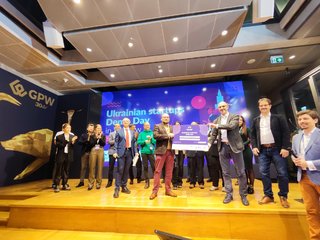
Since 2018 ICU Ventures has made over 30 investments
AMIDST THE WAR, UKRAINIAN STARTUPS STRIVE FOR SUCCESS AND SAVE LIVES’
Reflecting on ICU’s own venture capital portfolio, Roman Nikitov, Head of ICU Ventures, outlines the Ukrainian venture capital sector's resilience and adaptability during wartime. Start-ups in Ukraine have been at the forefront of cutting-edge developments in areas such as artificial intelligence, machine learning, and blockchain, which have helped to position the country as one of the leaders in the global technology landscape.
ICU has been investing in VC since 2018 with the investment thesis to back start-ups with the potential to be global businesses. Before the war, Ukrainian start-ups cumulative revenue reached its absolute top revenue since independence in 1991, with a gross figure of roughly $900m.[1] Yet even since the inception of the war, the Ukrainian venture capital space has remained buoyant, with 96% of Ukrainian start-ups having maintained their operations during the War, and the IT sector even having grown a further 24%, with exports in the sector exceeding $6bn during 2022. The start-up scene has demonstrated remarkable resilience despite numerous challenges. It has maintained a strong focus on creating new solutions across multiple sectors keeping the sector competitive and proving its value as an essential driver of the Ukrainian economy.
Since 2018 ICU Ventures has made over 30 investments, with ticket sizes ranging from $200K to $5 million, depending on the investment stage. About half of all the start-ups in the ICU Ventures portfolio are Ukrainian or have Ukrainian roots and have a deep tech element, an angle in which ICU has been found to exhibit a competitive edge in success over other players. Most of the country’s start-ups had contingency plans put in place before the war, with many companies using cloud technologies to store data and moving their base to the west of Ukraine to continue operations. All ICU Ventures portfolio companies have continued to operate and thrive, with half demonstrating growth even with all Russian revenues being axed.
But merely surviving is not the prevailing mentality of a Ukrainian start-up amidst the war. Some companies have found wartime use in their technology in helping to protect Ukrainian infrastructure from Russian cyber-attacks and safeguarding civilian lives. For example, Hideez, one of ICU Ventures portfolio companies, have joined forces with Yubico, a US based pre-war competitor, to provide data encryption technology to assist the Ukrainian government and critical infrastructure providers to withstand cyber-attacks from Russia.
Another example that demonstrates the ingenuity and resilience is how Respeecher, the voice cloning technology company, has developed an AI-based technology called Zvook (the Sound) that detects air missiles and drones flying over the cities and villages of Ukraine using radio sensors and artificial intelligence. This has allowed for sufficient warning to civilians to be able to hide in shelters and protect themselves.
“And this is just to mention a few,” says Roman Nikitov. “Еxamples are plenty and prevailing among the community on how the start-ups are contributing to the Ukraine’s defence and future victory and continuing to thrive despite the challenges we face. The world will hopefully learn of their efforts much more after the war is over”
About ICU Ventures
Who we are and what we believe
We are the venture capital arm of the ICU Group, an independent, multi-strategy investment firm that specialises in emerging and frontier markets.
We believe passionately in the power of technology to unleash the growth latent in emerging markets. We invest in exceptional founders with big dreams who work to harness that potential and build disruptive companies worldwide.
Since 2018 we have made over 30 investments, with ticket sizes ranging from $200K to $5 million, depending on the investment stage.
Our strategy
We focus on our investments on two strategic areas – global software and emerging market fintech.
In global software, we like deep tech, mobility and enterprise software and bias toward founders with Eastern European DNA.
In emerging market fintech, we invest in companies that offer credit and financial services to massively unbanked populations in Asia, Africa & Latin America. We also target companies that are building the next generation of financial infrastructure for these fast growing markets.
We have made investments in four continents. We keep our minds flexible and remain in a state of wonder about the potential around us. We love to learn about innovative technologies, investigate novel business models, explore fresh markets, and, of course, make new friends.
We invest more than capital. We connect our founders with contacts around the globe and in doing so build a bridge over which to exchange wisdom, insight and opportunity that benefits us all.
[1] Figures are from the Ministry of Digital Transformation of Ukraine on IT industry development







